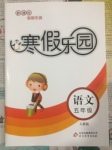题目内容
【题目】
下面短文有10处语言错误,请在有错误的地方增加、删除或修改某个单词。
注意:1.每处错误及其修改均仅限一词,
2.只允许修改10处。
One day Tom and I were walking down the street while we saw an old man fall off his bike. He was badly hurt. Many people crowded around us. Someone suggested carrying the old man to the roadside, so Tom disagreed. He has learned first aid. He said that they ought to leave him where he was and checked him first. At that time the old man wasn’t breathing. Tom asked me to call in the First Aid Center at once and he began to start the old man’s breathing, use the mouth-to-mouth way. Within five minute, the old man began to move a little and doctors also arrived. They said that we had done was correct. I have learned from this experience that a knowledge of first aid can make a really difference.
【答案】
(1)while→when
(2)us→him
(3)so→but
(4)has→had
(5)checked→check
(6)in去掉
(7)use→using
(8)minute→minutes
(9)that后面加what/that→what
(10)really→real
【解析】
(1)while表示“当……时”,从句多用进行时态,而此处不是,故把while改为when。
(2)根据上下文,应该是围着他,故要把us改为him。
(3)根据后面的disagreed,可见与上一句是转折关系,故把so改为but。
(4)全文用一般过去时,故这里也要用过去时,故把has改为had。
(5)分析句子,check是与leave并列,都在情态动词ought to后面,故应用原形。
(6)call sb.打电话给某人,后面直接跟宾语,不用加介词in,去掉。
(7)use the mouth-to-mouth way是作方式状语,它本身与前面之间没有连词,而且没有主语,故use肯定要用非谓语动词形式,再根据use与逻辑主语的关系是主动关系,故要改为现在分词。
(8)five是复数,故要把minute改为minutes。
(9)句意:他们说我们所做的是正确的。宾语从句中缺少宾语,而根据句意是表示“事物”,故在that后加what,或者是把that改为what也可以,因为that作为宾语从句的引导词在此可以省略。
(10)修饰后面的名词difference要用形容词,故把really改为real。

 寒假乐园北京教育出版社系列答案
寒假乐园北京教育出版社系列答案【题目】请认真阅读下列短文,并根据所读内容在文章后表格中的空格里填入一个最恰当的单词。注意:每个空格只填1个单词。请将答案写在答题卡上相应题号的横线上。
Research shows that the summer before college can be a dangerous time for teenagers, as they are between home and high school on the one side, and a more challenging and independent existence as a college student on the other.
Take drinking for example. Research has reported that teenagers tend to increase their alcohol use during the summer before college and in their first term. Such drinking can lead to tragedy: it’s estimated that more than 1,100 college students at 18 to 24 years of age die each year from alcohol-related injuries, including car crashes, and almost 600, 000 are injured under the influence of alcohol.
In addition to drinking, future freshmen may also have gaps in their knowledge about other aspects of university life. A study has found that students are “generally aware” of the fact that they have to place them into college courses and their school’s curricular requirements. In addition, many students hold misunderstandings such as “Getting into college is the hardest part”, and “I can take whatever classes I want when I get to college”. In fact, students’ courses may be determined by their level of preparation.
It is found that college-bound high-school graduates are faced with a number of potentially frightening tasks during the summer. For example, colleges typically require students to take placement tests(分班考试) and fill out a lot of paperwork, including housing and medical forms, over the summer. Completing these tasks may be especially frightening for low-income and first-generation college-bound students whose families may be short of experience with the college-going process.
In addition, it’s only in the summer after high-school graduation when students face the reality of paying the first college bill, which often includes unexpected costs like required health insurance. For college-intending students, successfully controlling the post-high-school summer thus requires a level of finance that may be unrelated to their ability to succeed in the classroom. As a result, students who have already broken through many barriers to college admission may fail to enter college.
Paring college-bound students with “fellow advisers”—students already in college who have been trained to support and coach their learners through the summer—improves the rate at which the learners show up at college. Even more wonderful, a low-cost campaign of text messages—in which researchers sent recent high-school graduates and their parents a series of eight to ten text-message reminders of key tasks to complete over the summer—is just as effective in increasing the rate of students who successfully make the change to college.
A little “summer pushing” could be a key step in getting students all the way across the finish line.
The Key to College Success: Summer | |
Facts | The summer before college throws 【1】 dangers to high-school graduates. |
College life is challenging and needs students’ 【2】 . | |
Reasons for college failure | Many misfortunes happening to future freshmen are related to 【3】 |
Future freshmen have false 【4】 about college life. | |
Tasks related to going to college may create some 【5】 for a certain group of high-school graduates. | |
Finance may become a 【6】 even to those who can give good academic performance. | |
【7】 | Get ready, as the level of preparations really does 【8】 . |
Future freshmen may be recommended to 【9】 to “fellow advisers”. | |
Text messages can be used as 【10】 span>of completing key tasks. | |